Radio-Canada's deep-dive interviews with 5 party leaders delivers more than canned answers
Leaders of major parties pressed on policies and positions live on air, one after the other
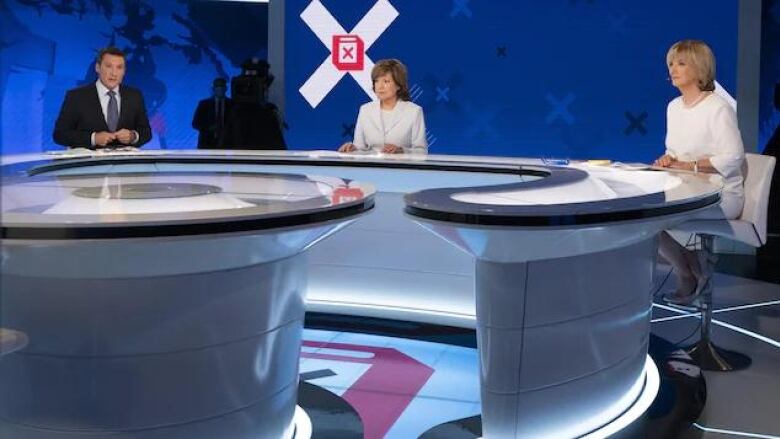
The five federal party leaders took part on Sunday evening in Radio-Canada'sspecial program where the leaders were asked focused questions that prompted some of them to step out of their well-rehearsed campaign lines.
Anne-Marie Dussault, Cline Galipeau and Patrice Roy grilled each leader live, one after the other, for up to 30 minuteson their vision of the federal election campaign's issues.
Justin Trudeau specifies his vaccination 'consequences'
From the outset, the Liberal leader was asked about the decision to call an election in the midst of a health crisis. Does he regret having triggered it? "No," Justin Trudeau answered. "Will this be his last?" Not necessarily, he said.
"I understand that this does not tempt [Canadians] to go to an election," admitted Justin Trudeau. "We have big decisions to make," he said. "People deserve to have a choice."
On the subject of vaccinations, Trudeau asked to reveal what the consequences would be for officials who refuse to be vaccinated . "You will not be able to show up at the office," he said, adding that the vaccination rate of civil servants is quite high.
When it comes to the national debt, Trudeau said he was not worried, stressing that the debt-to-GDP ratio will decrease over the next few years.
The crisis in Afghanistan, which occupied much of the first two weeks of the campaign, placed the Liberal leader on the defensive.
When asked how Canada can help the Afghans who are stuck there, Trudeau acknowledged it will not be easy.
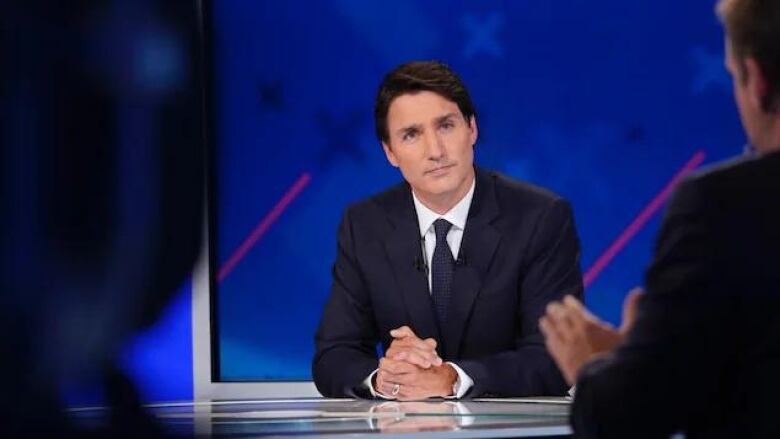
"It is a disastrous situation in Afghanistan, it is painful to see, we will do as much as possible to get as many people out as possible," he said.
Since taking office, Canada has been the only G7 country whose emissions have increased. Justin Trudeau defended his record before turning the question toward the Conservatives' record on climate.
"For 10 years, we had a government that did nothing. We had to start from zero," he said.
Regarding his 2019 pledge to plant two billion trees, Trudeau was unable to say how many were planted. "You have to grow them;you can't just plant seeds," he said.
The appointment of Mary Simon, who does not speak French, as Governor General was also a subject on the show where Trudeau was asked if he understood the frustration of francophones who have complained about this choice.
"We are at a time now when Mary Simon was supposed to be the exception, not a precedent, but the exception," Trudeau said of Simon, who speaks English and Inuktitut and is the first Indigenous person to hold the position.
I'm a new leaderwith a new approach, says O'Toole
Conservative Leader Erin O'Toole worked to position himself as a driver of change in his party, saying several times that he is a new leader, with a new approach.
However, O'Toole was pressed on the differences between the policies he has on offer and the policy positions of the social conservatives in his party. Social conservatives in O'Toole's party contributed greatly to his victory in the leadership race but have espoused different policy positions from his on issues such as climate change, vaccination and abortion.
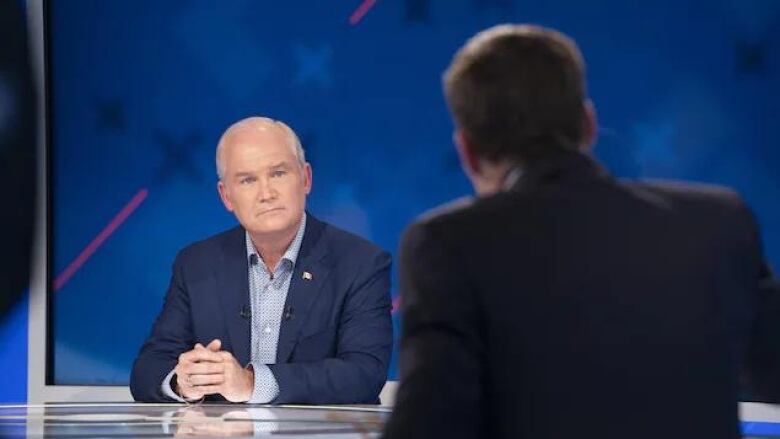
O'Toole was challenged on the credibility of his leadership on the environment after an internal party vote last spring saw 54 per cent of party members vote against a motion recognizing climate change as real and needing governments to tackle it.
O'Toole said that, despite the vote, climate change is a priority for him, and that his entire team is behind his plan.
That plan, O'Toole said, includes the continued development of the oil industry, with the expansion of the Trans Mountain and building of the Northern Gateway, which he described as important projects. "These are my priorities," he said.
Asked about the possibility of forcing a pipeline through Quebec, O'Toole did not directly answer the question, but suggested that a Conservative government would work only to develop Trans-Mountain and Northern Gateway.
On the issue of compulsory vaccination, Mr. O'Toole maintained that even though he encouragesCanadians to be vaccinated, personal choices should be respected. He advocated the use of rapid tests and masks for the unvaccinated, whether for the general public, federal officials or its own members.
"We must educate Canadians and Quebeckers and not force them on health issues. I have the same position as the unions," O'Toole said.
On the issue of abortion, O'Toole maintained that the freedom of conscience that his party wishes to grant to doctors who would like to be able to refuse to perform certain acts did not risk compromising access to abortions.
"It's possible to have reasonable accommodations for doctors and nurses," he said.
On the issue of health transfers to the provinces, O'Toole avoided committing to immediately raisingthe transfer amount by $28 billion, bringing the federal government's share of health care up to 35 per cent. That is the figure demanded by the provinces earlier this year.
Taking care to the end not to deviate from the message he has conveyed since the start of the campaign, O'Toole also refused to directly condemn the conspiratorial comments of Conservative candidate Cheryl Gallant, who has been speaking of a possible climate lockdown. The Conservative leader distanced himself from Gallant and her comments Sunday without naming the candidate.
Blanchet defends himself from being close to the CAQ
Bloc Qubcois Leader Yves-Franois Blanchet was asked about his intention to push for Quebec independence.
"There has been no change in the National Assembly of Quebec," he replied, saying that during a pandemic isnot the time to talk about independence.
"However, what happened was that for two years, quite systematically, we obtained or contributed to obtaining gains for Quebec," Blanchetsaid.
Asked if the Bloc Qubcois has become a front for the CAQ, acting as a proxy for the current Quebec government, Blanchet said that even if there are similarities between the parties, "the difference is that we want to complete the exercise and that one day Quebec be sovereign," Blanchet said.
"The fact that two political parties are resolutely nationalist, uninhibited, tired of being called racist [and that] we have things in common on the economic vision of Quebec, does not mean that one is inspired by the other," he said.
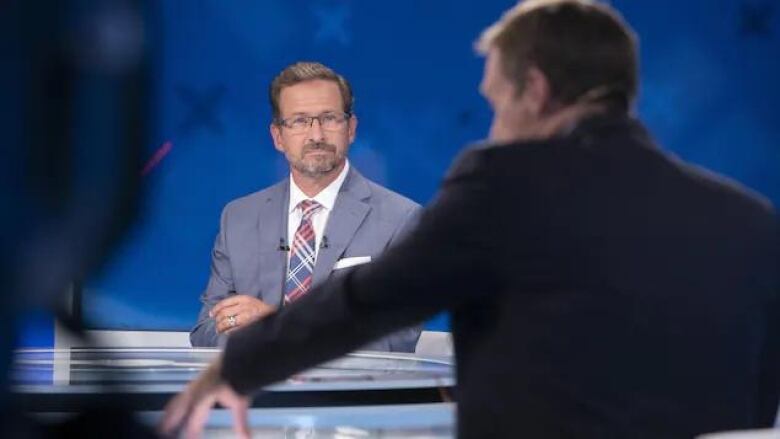
The Bloc leader, however, was in favour of a Quebec-Lvis highway tunnel under the St. Lawrence River,saying he understands the frustration of the people of the South Shore who have criticized the project for its potential environmental impact.
"I know it can be done in a much more ecological way, but the decision will not be made by me," he said, noting that the decision rests with the Quebec government.
Blanchet also said the Conservatives have a less centralizing approach in his eyes than the Liberals, but that Erin O'Toole's positions on climate change, health transfers and child care make the Conservatives incompatible with the interests of Quebec.
As for the compulsory vaccination of civil servants, Blanchet criticized Trudeau for his approach and said he believes that it's necessary to educate people who are resistant to vaccines for various reasons.
Blanchet says Trudeau is wrong when he says "I am going to sanction you" because he does not even know how he could do so, he added. .
Jagmeet Singh asserts his beliefs
From the start, the leader of the New Democratic Party was pressed to explain what differentiates his party from the Liberal Party of Canada in policy areas such as social housing.
"Justin Trudeau, these are fine words but not concrete actions," said Singh, who noted that Canada hasthe worst record of affordability of housing among the G7 countries.
When asked if the NDP's policies were too centralized and would interfere with the provincial jurisdiction, he said his party is focused on solving problems.
"When I talk to people, they ask for solutions," he said. "To me, a leader is someone who seeks solutions."
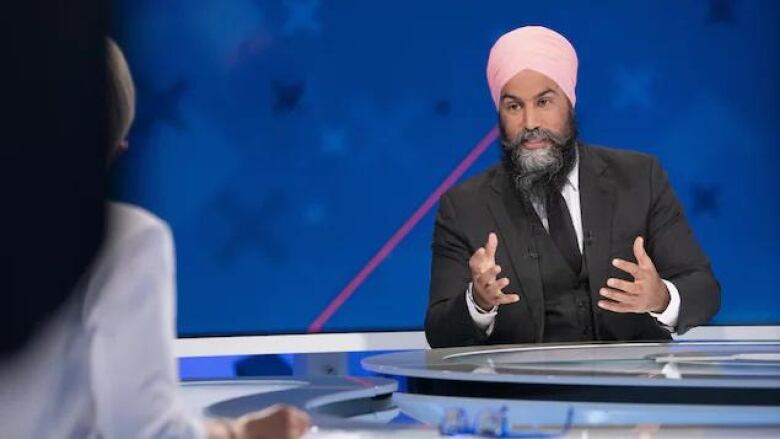
Brandishing the spectre of health-care cuts, Singh warned that a Conservative government would be bad for Canadians.
Singh said that if workers for whom vaccination became compulsory refused the vaccine, there would have to be consequences for them in the name of the common good. Singh, who is proposing to quickly establish the equivalent of a vaccination passport for all Canadians, specified that Quebec would keep its provincial vaccine passport system.
"It's cool;it will continue with Quebec," he said.
The NDP is proposing a ban on all new for-profit long-term-care facilities in Canada and said the existing long-term-care homes that are operating on a for-profit model should be made into non-profit organizations.
Singh also committed to eliminating fossil fuel subsidies.
Annamie Paul: The environment should not be a partisan issue
Green Party Leader Annamie Paul was pressed on the ongoing bickering she faces among other factions of the federal Green Party, bickering that erupted into the public just before the campaign when Green MP Jenica Atwin defected to the Liberals and legal proceedings were initiated to oust Paul as leader.
"Each party has had its stories of people who have crossed over for other parties. But when it matters, the Greens are there for each other," she said.
She made her remarks from a studio in her Ontario riding of Toronto Centre, where she has been campaigning since the election was called.
"I didn't say I wouldn't tour, just that I will be spending the majority of my time in my riding," she said when asked about her willingness to lead a truly national campaign.
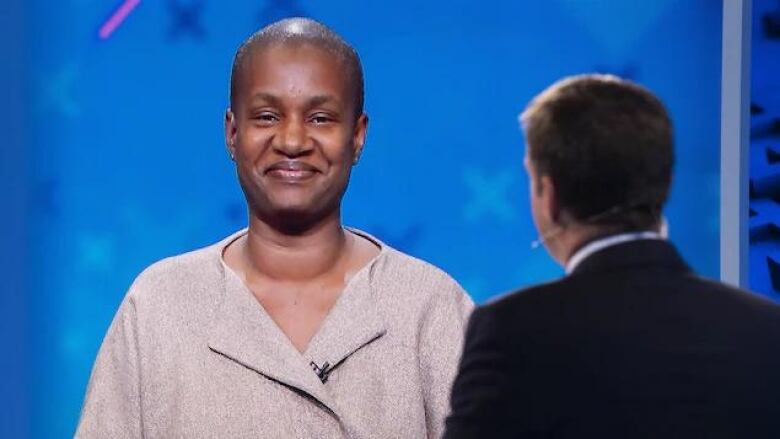
Paul defended her plan to tackle climate change insisting that the target of a 60-per-cent reduction in greenhouse gases [below 2005 levels by 2030] being proposed by the Greens is realistic.
"We can see that all our partners at the international level are setting very ambitious targets, we have the United Kingdom with 78 per cent and the United States with 50 per cent," she said. "It is not possible to continue to invest in oil projects and think of hitting even the most modest targets."
Paul said she does not support a mandatory vaccination program. Rather, she said she believes in recognizing that exceptions are necessary.
"Vaccines are a key part of our fight against the pandemic. Everyone is encouraged to get vaccinated. But we know very well that there will be exceptions. There are reasonable arrangements for these people, we have to create them and we will create them..
"We have to recognize that there are people here in Canada who have been traumatized by their interactions with the health system, for example," she added.













_(720p).jpg)


 OFFICIAL HD MUSIC VIDEO.jpg)
.jpg)



























































































